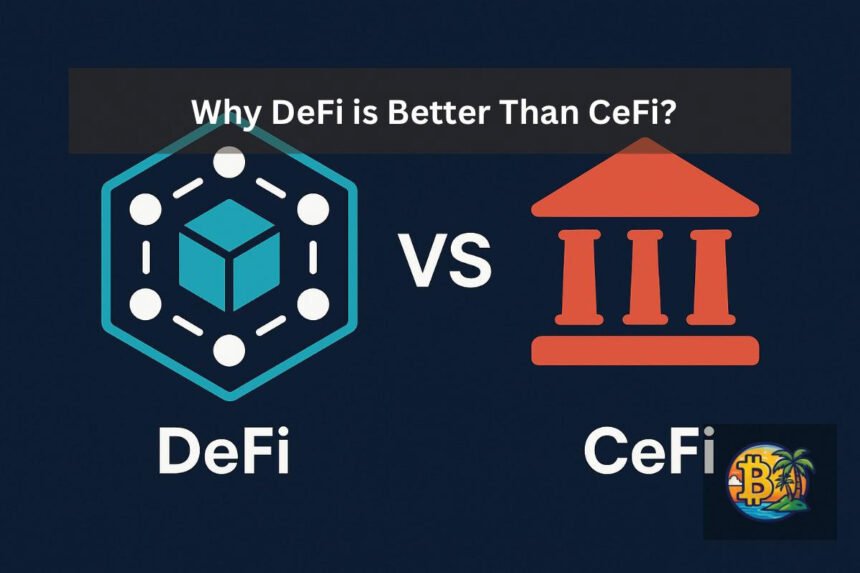Key Insights
- Banks and other centralized institutions have controlled the way we save and invest over the decades.
- Things are changing worldwide with the rise of DeFi, which removes the need for these intermediaries.
- DeFi is rewriting the rules with its borderless means of providing access to money.
- This is becoming a full-blown movement, and while there are still risks within the space, the question is ready to change from “Why DeFi?” to “Why not DeFi?”
For decades, centralized financial systems have controlled the way we save, invest, borrow, and move money.
Banks, insurance companies, and other financial middle parties like brokers had control over the system, and they made sure that everyone knew it.
They set the rules, held our funds, and decided who got access to credit or investment opportunities.
However, things are changing on a massive scale.
Decentralized Finance, or DeFi, is rewriting the rules. This financial system is built on blockchain technology and has completely removed the need for middlemen.
Users now have direct control over their money in a transparent and accessible way.
Here are some of the reasons why Defi is now being seen as a better alternative to centralized finance.
Control Over Your Own Money
One of the biggest advantages of DeFi is that it gives users full control over their funds.
In centralized finance, your money sits in a bank. The bank can freeze your account, block transactions, or even go bankrupt for any reason, taking your money down with it.
However, in Decentralized Finance, you manage your funds through digital wallets.
This means that you don’t need permission from anyone to use your assets, transfer them or invest in whatever you choose.
Everything is handled through smart contracts, or automated pieces of code that execute actions when certain conditions are met.
This means that there is no gatekeeper between you and your finances.
Greater Financial Inclusion
Decentralized Finance opens up new ways of moving money to people who have always been excluded.
Billions of people around the world don’t have access to a bank account, either because of a lack of documentation, poor credit scores, or living in underbanked regions.
With DeFi, however, all that anyone needs is a smartphone and internet access. No need to fill out lengthy forms, pass credit checks or meet high minimum balance requirements.
Anyone can borrow, lend, trade or earn interest on their crypto holdings from anywhere in the world.
This is especially valuable in countries with unstable currencies or limited banking systems.
In short, DeFi provides a worldwide financial system that operates 24/7, without borders.
Transparency and Trust
How centralized financial systems work is not very well understood by the average person.
Most users do not know what banks do with their money or how investment firms operate behind closed doors.
Decentralized Finance flips this on its head by making everything transparent and verifiable.
Anyone can inspect the code of a smart contract, track transactions, verify transfers or audit protocols in real-time. This makes it much harder for fraud and manipulation to go unnoticed.
Trust in DeFi is built through transparency and participation from the community. Decentralized Finance makes sure that projects are open-source and decisions are made through decentralized governance.
Lower Costs and Faster Transactions
Centralized financial institutions come with a long list of fees. They take money from account holders for account maintenance, wire transfers, foreign exchange, ATM withdrawals and more.
Over time, these costs tend to add up, especially for people sending money across borders.
DeFi reduces many of these fees by cutting out intermediaries with peer-to-peer systems that allow better transfers.
Anyone can now send money internationally in minutes, not days, for a fraction of the cost.
Smart contracts make it easier to complete tasks like lending, trading, borrowing or yield farming, which means that there is no need for expensive human middlemen.
Innovation and Earning Opportunities
Decentralized Finance has unlocked many new financial tools that simply don’t exist in traditional finance.
Yield farming, liquidity mining, flash loans, and staking are just a few examples of these.
All of the above tools allow users to earn returns on their crypto, for example, by providing liquidity to a decentralized exchange in exchange for rewards every time someone trades using your funds.
Anyone can even stake their tokens to help secure the network and earn rewards in return.
This level of innovation is hard, or even near impossible, to match in centralized finance, where regulations and bureaucracy slow things down.
Worldwide and Borderless by Design
Centralized finance is tied to borders, governments, and specific legal systems.
This means that opening a bank account in another country, sending money internationally, accessing foreign investment markets, or even holding funds in an international account can be difficult.
DeFi, on the other hand, has been global from day one.
It doesn’t care where you live, what your passport says, where you are from, or which bank you use.
Anyone can interact with DeFi platforms using a crypto wallet, regardless of where in the world they live.
This borderless nature makes decentralized finance extremely valuable for worldwide collaboration and commerce.
The Future of Finance
DeFi is still in its early stages. However, it is growing at an unmatched pace every year.
Billions of dollars are already locked in DeFi protocols, and new projects are launching every week. While DeFi “may” never fully replace centralized finance, it is creating a more open and inclusive financial system.
For many, DeFi represents financial freedom to control their own assets. It’s not just a new technology. Instead, it has become a full-blown movement.
While there are still risks within the space, the rewards are hard to ignore.
DeFi has a real shot at changing the way we think about money and financial freedom.
As more people realize the power of decentralized finance, the question won’t be “Why DeFi?”; it will be “Why not DeFi?”







